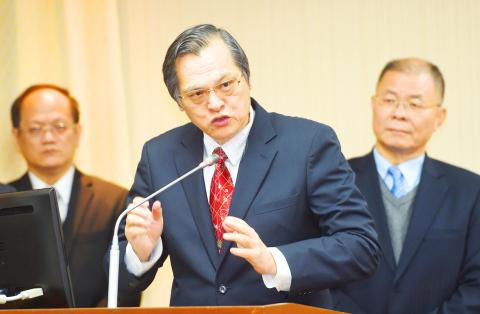A proposed anti-infiltration bill would crack down on acts of infiltration, rather than target certain people, while agencies would not “punish” offenders, but lodge lawsuits against them, Mainland Affairs Council (MAC) Minister Chen Ming-tong (陳明通) said yesterday.
Chen made the remarks at the weekly Cabinet meeting.
The opposition Chinese Nationalist Party (KMT) this week has dubbed the bill “green terror,” “thought censorship” and an attempt to reinstate martial law.

Photo: Liu Hsin-de, Taipei Times
The bill defines acts of infiltration by integrating provisions from existing laws — including the Political Donations Act (政治獻金法), the Presidential and Vice Presidential Election and Recall Act (總統副總統選舉罷免法), the Civil Servants Election and Recall Act (公職人員選舉罷免法), the Referendum Act (公民投票法), the Assembly and Parade Act (集會遊行法) and the Social Order Maintenance Act (社會秩序維護法) — and strengthens regulations covering infractions that constitute infiltration, Chen said.
The bill would not target people, nor would it give agencies the right to punish offenders, he said, adding that it would instead give agencies the authority to file lawsuits against those who have allegedly committed infractions.
The nation’s three-tiered judicial system would decide whether a defendant is guilty and what their penalty would be, he said.
The council believes a bill to crack down on infiltration is necessary, Chen said, citing Chinese President Xi Jinping’s (習近平) speech on Jan. 2, which Chen said revealed China’s plan to annex Taiwan through infiltration, “united front” tactics and so-called “democratic negotiations.”
China’s growing economic power has intensified its influence in other nations and several democracies — including the US, the UK and Australia — have introduced legislation against infiltration, Premier Su Tseng-chang (蘇貞昌) said.
The nation is at the center of Chinese infiltration and needs an anti-infiltration act more than any other nation, he said.
The bill would not affect law-abiding citizens working or studying in China, Su said, adding that the Democratic Progressive Party (DPP) should allay the public’s concerns through extensive dialogue.
Executive Yuan spokeswoman Kolas Yotaka said that Chinese meddling in the nation’s elections started many years before the bill was introduced, when asked by a reporter with the Chinese-language China Times whether the Executive Yuan thinks five days is long enough for “extensive dialogue with the public” — as the DPP-controlled Legislative Yuan has scheduled the bill’s final review on Tuesday next week.
Taiwanese have long discussed Chinese infiltration, she said, adding that the bill was sponsored by lawmakers, not the Executive Yuan, reflecting the anxiety and concern of their constituents.
Yesterday, Hon Hai Precision Industry Co (鴻海精密) founder Terry Gou (郭台銘) softened his stance against the bill, saying that he is “not against it.”
On Wednesday, Gou had said that he would launch a “Sunflower movement 2019” and sleep at the Legislative Yuan if the DPP insisted on passing the bill on Tuesday next week.
The tycoon yesterday said that he was not opposed to the legislation, adding that his previous remarks were meant to convey his hope that the legislative process would be open and transparent.
Additional reporting by CNA

DAREDEVIL: Honnold said it had always been a dream of his to climb Taipei 101, while a Netflix producer said the skyscraper was ‘a real icon of this country’ US climber Alex Honnold yesterday took on Taiwan’s tallest building, becoming the first person to scale Taipei 101 without a rope, harness or safety net. Hundreds of spectators gathered at the base of the 101-story skyscraper to watch Honnold, 40, embark on his daredevil feat, which was also broadcast live on Netflix. Dressed in a red T-shirt and yellow custom-made climbing shoes, Honnold swiftly moved up the southeast face of the glass and steel building. At one point, he stepped onto a platform midway up to wave down at fans and onlookers who were taking photos. People watching from inside

A Vietnamese migrant worker yesterday won NT$12 million (US$379,627) on a Lunar New Year scratch card in Kaohsiung as part of Taiwan Lottery Co’s (台灣彩券) “NT$12 Million Grand Fortune” (1200萬大吉利) game. The man was the first top-prize winner of the new game launched on Jan. 6 to mark the Lunar New Year. Three Vietnamese migrant workers visited a Taiwan Lottery shop on Xinyue Street in Kaohsiung’s Gangshan District (崗山), a store representative said. The player bought multiple tickets and, after winning nothing, held the final lottery ticket in one hand and rubbed the store’s statue of the Maitreya Buddha’s belly with the other,

‘NATO-PLUS’: ‘Our strategic partners in the Indo-Pacific are facing increasing aggression by the Chinese Communist Party,’ US Representative Rob Wittman said The US House of Representatives on Monday released its version of the Consolidated Appropriations Act, which includes US$1.15 billion to support security cooperation with Taiwan. The omnibus act, covering US$1.2 trillion of spending, allocates US$1 billion for the Taiwan Security Cooperation Initiative, as well as US$150 million for the replacement of defense articles and reimbursement of defense services provided to Taiwan. The fund allocations were based on the US National Defense Authorization Act for fiscal 2026 that was passed by the US Congress last month and authorized up to US$1 billion to the US Defense Security Cooperation Agency in support of the

‘COMMITTED TO DETERRENCE’: Washington would stand by its allies, but it can only help as much as countries help themselves, Raymond Greene said The US is committed to deterrence in the first island chain, but it should not bear the burden alone, as “freedom is not free,” American Institute in Taiwan Director Raymond Greene said in a speech at the Institute for National Defense and Security Research’s “Strengthening Resilience: Defense as the Engine of Development” seminar in Taipei yesterday. In the speech, titled “Investing Together and a Secure and Prosperous Future,” Greene highlighted the contributions of US President Donald Trump’s administration to Taiwan’s defense efforts, including the establishment of supply chains for drones and autonomous systems, offers of security assistance and the expansion of